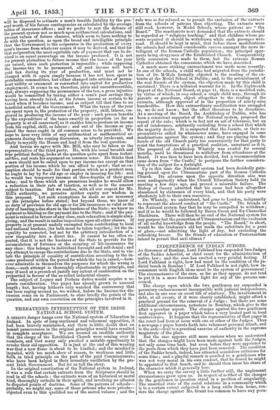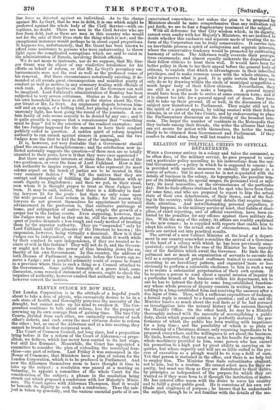INDEPENDENCE OF INDIAN JUDGES.
As Governor of Bombay, Lord Falkland has suspended two Judges of the Sudder Adawlut, or chief court for the administration of native law ; and the ease has excited a very painful feeling. If Lord Falkland is right, how bad must be the condition of the ju- dicial bench in Bombay ! If Lord Falkland is not right, how in- consistent with English ideas must be the system of government ! The circumstances of the case so far as they appear, do not tend to put it in a more favourable light for any of the persons con- cerned.
The charge upon which the two gentlemen are suspended is pecuniary embarrassment incompatible with judicial independence and also in one case an overt life of adultery. The involvement in debt, at all events, if it were clearly established, might afford a practical ground for the removal of a Judge ; but there are some additional circumstances, notorious in Bombay, which give to the affair a peculiar aspect. The charges against the two gentlemen first appeared in a paper which takes a very heated part in local controversies. It happens that the representative of that paper in the court had been at issue with one or other of the Judges. Thus a newspaper pique bursts forth into vehement personal attack, and is the antecedent to a practical exercise of authority in the supreme magistrate of the place. But the ease appears still more curious when we understand that the charges might have been made against both the Judges, not only some time back, but even before they were appointed to the posts from which they have just been removed. The condition of the Sudder bench, indeed, has attracted scandalous criticisms for some time ; and a playful remark is ascribed to a gentleman who was not very moral in his own conduct, that he feared he might be appointed to that bench, and he should then incur his share of the character which it generally bore.
When we carry the survey a little further still, the unpleasant circumstances grow upon us. In respect of neither of the charges do the gentlemen in question stand in a position of singularity. The unsettled state of the social relations in a community which is to a certain extent subjected to a long exile from home, ren- ders the charge against Mr. Grant too common to have any peen- liar force as directed against an individual. As to the charge against Mr. Le Geyt, that he was in debt, it is one which might be preferred against the whole body of the Civil Service—with ex- ceptions, no doubt. There are men in the Civil Service who are free from debt, just as there are men in this country who would not for the sake of their lives state the thing which is not; and the exceptional instances would perhaps be in about equal proportions. It happens too, unfortunately, that Mr. Grant has been known to afford some assistance to persons who were endeavouring to throw light upon the complicated corruptions which are said to exist in the administration of Baroda, involving British officials.
We do not mean to insinuate, nor do we suppose that Mr. Gre- gor Grant was the object of any vindictive retaliation for his efforts on behalf of reform, or that Mr. Le Geyt's pecuniary em- barrassments were not the real as well as the professed cause of his removal. But these circumstances notoriously existing, it de- manded at all events great circumspection and manifest purity of conduct as well as motive in any summary, dealing with officials of such rank. A direct motive on the part of the Governor can well be imagined. Lord Falkland's administration of Bombay has been subjected to very severe criticisms. Stories as to the conduct of his own household have been as rife as the stories about Mr. Gre- gor Grant or Mr. Le Geyt. An unpleasant dispute between him- self and an ensign, of a trifling kind, but placing a Governor in an unseemly light, has been going the round of the journals. A cer- tain laxity of rule seems scarcely to be denied by any one ; and it is quite possible to suppose that a consciousness that " something must be done" led to the selection of the readiest examples; and the two Judges happened for the moment to have their conduct publicly called in question. A sudden spirit of reform inspired authority to run amuck against sinners in general, and the two Judges were the first to feel the force of the onslaught.
It is, however, not very desirable that a Government should plead the excuses of thoughtlessness ; and the retribution now M-
eted naturally: suggests the question—if these men are so totally unsuited to their posts, how is it that they were ever appointed ?
But there are greater interests at stake than the fortunes of the two gentlemen or even the fame of Lord Falkland How is Bri- tish authority gentlemen, inspire respect, if those who represent its most solemn aspect on the bench of justice are to be treated in this very summary fashion ? We tell the natives that they are corrupt and incapable of fulfilling the judicial function with so much dignity as Englishmen; and then we put, in their stead, men whom it is thought proper to treat as these Judges have been. It may be said, indeed, that there is a difficulty in find- ing lawyers fit for the posts : but then we only come upon the wide ground of local reform in India; for the- reason why lawyers do not present themselves for appointment by natural advancement in the profession is, that exclusive patronage at home, and subjugation of native talent, cripple the growth of a proper bar in the Indian courts. Even supposing, however, that the Judges were as bad as they can be, still the mere abstract re- spect of justice demands a less rough and ready method of treating them by the superior authority. They are " suspended " only by Lord Falkland, until the pleasure of the Directors be known ; the suspension, however, being virtually a dismissal. How is it that Judges can be independent, or that men can thiek it worth while by their conduct to earn independence, if they are treated as te- nants at will in this fashion? They will not do it, and the Govern- or ought not to have the power of thus breaking down the au- thority of his own Government. In this country, the address of both Houses of Parliament is requisite before the Crown can re- move a Judge ; and a parallel solemnity could of course be found in a province where there is such a thing as a Council attached to the Government. Some public formality of a grave kind, some discrassion, some recorded statement of reasons, ought to check the impulses of authority, however exalted that authority may be, and however correct the motives.



























 Previous page
Previous page